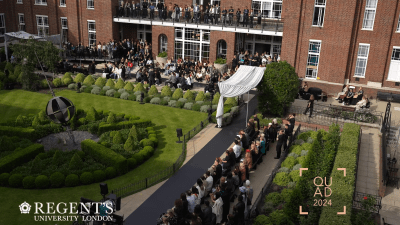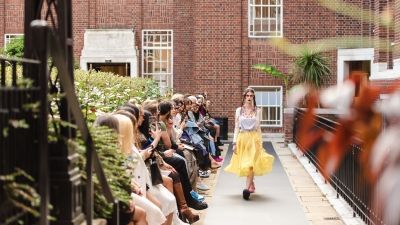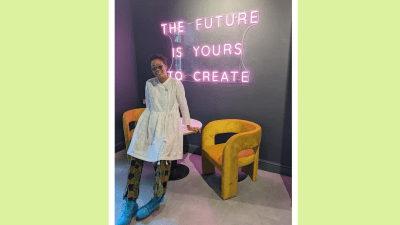Overview
Design and produce marketable collections that revolutionise the industry.
From sketching and prototyping to construction and branding, this course teaches you how to design and build marketable collections that target your desired audience while reflecting your personal aesthetic and story, producing innovative collections that stem from customer research and creative experimentation.
Why Regent's
- An intimate campus: located in the heart of London’s royal Regent’s Park
- Unparalleled global connections: gain exposure to leading industry professionals
- Future-facing: an innovative curriculum structure that's unique to Regent's
- Small class sizes: experience tailored attention, support and guidance
- Collaborative studio setting: with access to professional workrooms, equipment, software
- Industry-focused: work on live projects and briefs with leading fashion brands
- Creative experimentation: develop your own design identity, using emerging tech
- Prime location: interact with London’s most coveted fashion brands and retailers
Discover more!
What to expect
Working practically in a creative workshop setting, you'll be guided through the art of pattern cutting, drape, garment construction, textile development, illustration and digital media, as you build a collection that embodies your personal philosophy and showcases your practical skills. Take advantage of:
- Professional design studios
- Sewing and pressing workrooms
- Fabric library and workshop
- Mac and PC labs with industry software
- Photography and TV studios
- Laser cutter, 3D printers, fabrication lab
- AutoCAD lab with plotter
You'll investigate emerging technology (from digital applications to growing your own fabric) and learn to stay at the forefront of the industry – developing a strong eye for future trends.
Exploring the full creative production process, from design to promotion, you’ll develop your research skills, idea generation, and presentation techniques – and learn how to incorporate storytelling, branding, and marketing approaches. You’ll also examine the overlaps between art, culture and history – deepening your understanding of contextual, contemporary fashion.
Your hard work culminates in a final fashion show, where you'll showcase your collection and portfolio to an audience including press and industry professionals.
This course offers a direct pathway to our MA International Fashion Marketing.
London-centric learning
With London on your doorstep, you’ll have opportunities to engage with all aspects of the fashion arena – gaining practical experiences and building valuable industry relationships.
- Develop a portfolio of campaigns and creative work, ready for interviews
- Get involved in campaigns and shoots for London Fashion Week
- Join industry placements to build relationships and gain first-hand experience
- Take field trips to museums, exhibitions and agencies. We've had:
- Private tours of the McQueen exhibition space on Bond Street
- Study visits to clothing archives at The Vintage Showrooms
- Trips to Harrods, Tate Modern, Barbican, Royal Academy, V&A
- Talks at magCulture: learning how they assist young creators
You’ll also work closely with leading fashion brands on live briefs and client pitches. Recently, students have collaborated on collections with:
As well as Paco Valiente, Chief Digital & Marketing Officer at HOFF, to create a limited edition sneaker to be sold in store.
We've also had guest speakers on campus, including:
- Michael Ward, Managing Director at Harrods
- Andrew Maag, Former CEO at dunhill
- Nicole Bischofer, Head of Womenswear at COS
- Ellie-Grace Frost, Designer at Louis Vuitton
- Jessica Bumpus, Fashion Journalist and former Digital Fashion Editor at Vogue
- Virginia James, former Head of Design at Pringle
- Angela Quaintrell, Fashion Buying Consultant
- Melanie Walker, former Head of Design at Victoria Beckham
- Lizzy Bowering, Head of Catwalks at WGSN
A tailored experience
We put you in the driving seat – shaping your education from day one:
- Your own support officer: receive tailored advice and support when needed
- Academic guidance: access regular one-to-one tutorials – at least an hour each week
- Flexible modules: personalise your course with a choice of special electives
- Additional language classes: prepare for domestic and international opportunities
Foundation year
In your Foundation year, you'll gain a solid grounding in academic skills and principles, as well as an introduction to your chosen subject area. It will provide a rich and varied experience to ensure you’re prepared for degree-level study in the UK – ready to develop specialist knowledge and confidently make the most of your course.
Some modules will be taken with students heading towards the same or related subject areas, while others will be taken with a blend of students – enabling you to mix with peers who bring a range of different perspectives and experiences to the classroom. You’ll take two modules related to your subject area and eight shared modules covering key skills like communication, critical thinking, cultural understanding, politics, data, creativity and entrepreneurship.
Once you’ve successfully completed your Foundation year, you’ll directly progress to Year 1 of your chosen degree-level course.
Download course specification.























